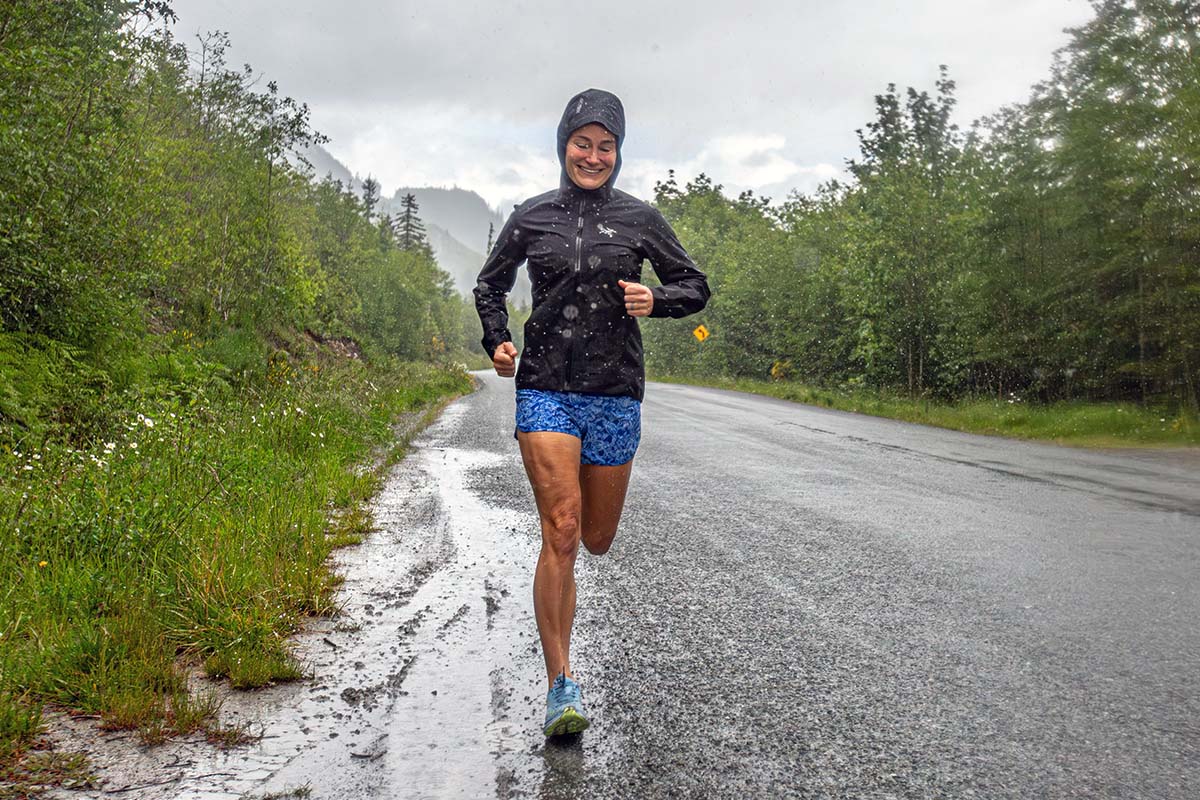
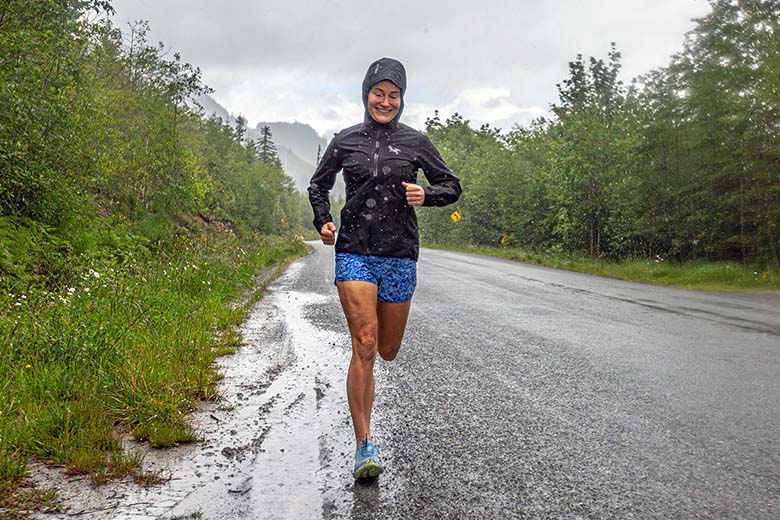
Price: $400
Weight: 5.7 oz. (women’s small)
Waterproofing: 3L Gore-Tex
What we like: A premium and highly protective rain shell that’s purpose-built for trail running.
What we don’t: Limited overall appeal—this is an expensive and very specialized piece.
See the Women's Norvan Shell Jacket See the Men's Norvan Shell Jacket
Arc’teryx’s Norvan collection is purpose-built for trail running, and the Norvan Shell Jacket stands out for its trustworthy protection in a truly ultralight package. Featuring Gore’s proven 3-layer waterproof membrane and a streamlined but practical feature set, I came away with high praise after testing the women’s version this past summer. It’s undeniably pricey for such a specialized piece, but I stayed perfectly dry and comfortable on wet trail and road runs throughout Vancouver Island and in shifting alpine conditions in Canada’s Yukon Territory. Below are my impressions of the Norvan Shell Jacket. To see how it stacks up to the competition, check out our articles on the best rain jackets and best women’s rain jackets.
While ultralight, the Arc’teryx Norvan Shell Jacket doesn’t skimp on protection with a proven 3-layer Gore-Tex construction that’s easy to trust in inclement weather. My first outing with the shell was a lengthy run along the west coast of Vancouver Island in typical (read: very wet) rainforest conditions. Rather than pack it in, I committed to the onslaught and had a blast running on the muddy and puddle-laden but empty trails. Despite extended exposure, I came home and stripped off the shell to find my shirt perfectly dry underneath. I’ve been similarly impressed by the Norvan’s wind-blocking abilities—enough so that I now reach for it over my Patagonia Houdini windbreaker given the Arc’teryx’s added wet-weather assurance (the Houdini only has a standard DWR coating for fending off moisture).
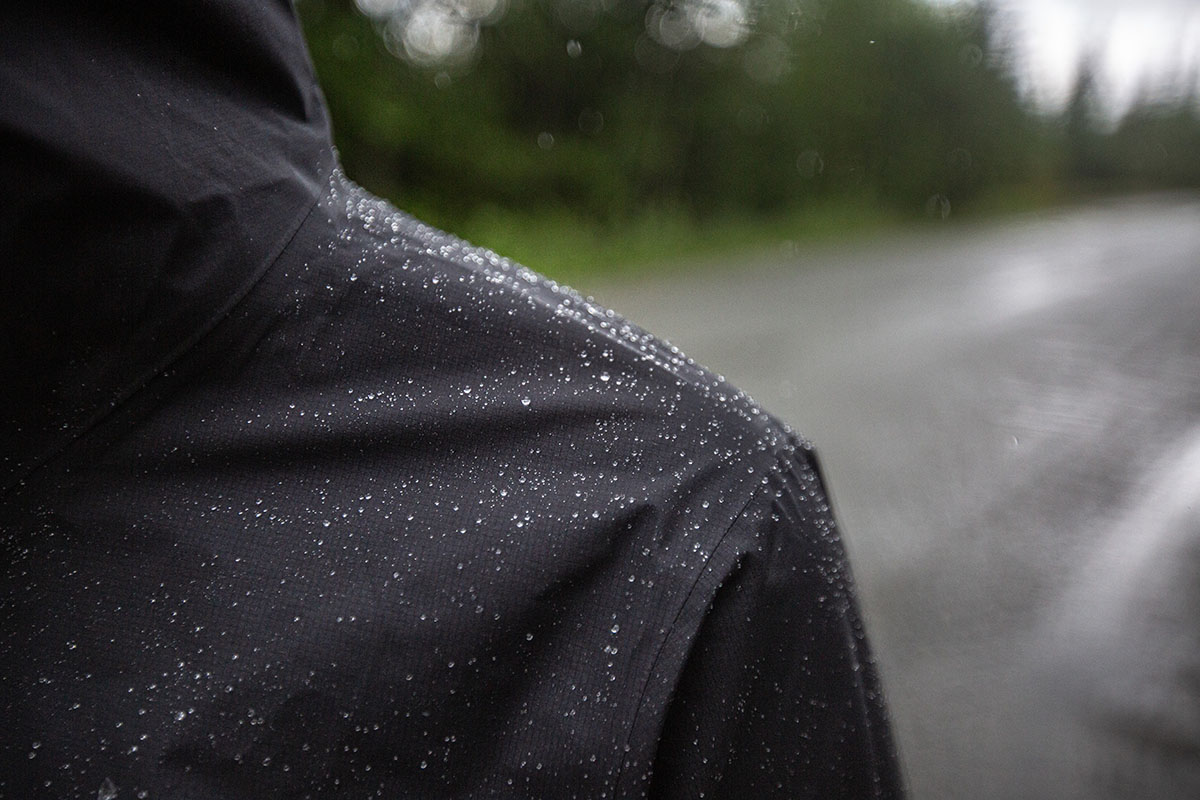
Arc’teryx also equipped the Norvan Shell Jacket with a couple protective features worth calling out. First is the hood, which is relatively basic but boasts a single drawcord at the back for dialing in fit. Once cinched, the hood fits snugly both with and without a ball cap or beanie underneath, and the brim extends just far enough to prevent rain from dripping into my eyes if I’m standing still. Additionally, the elasticized cuffs pair well will thin gloves, although I’ve found that the aperture is a little wide over bare wrists and allows moisture to seep in. The hem is also elasticized but less prone to moisture entering due to its orientation (facing downward). All in all, the Norvan won’t be mistaken for a feature-rich hardshell like Arc’teryx’s own Beta AR Jacket, but it’s all I need and nothing I don’t to comfortably run in the rain.
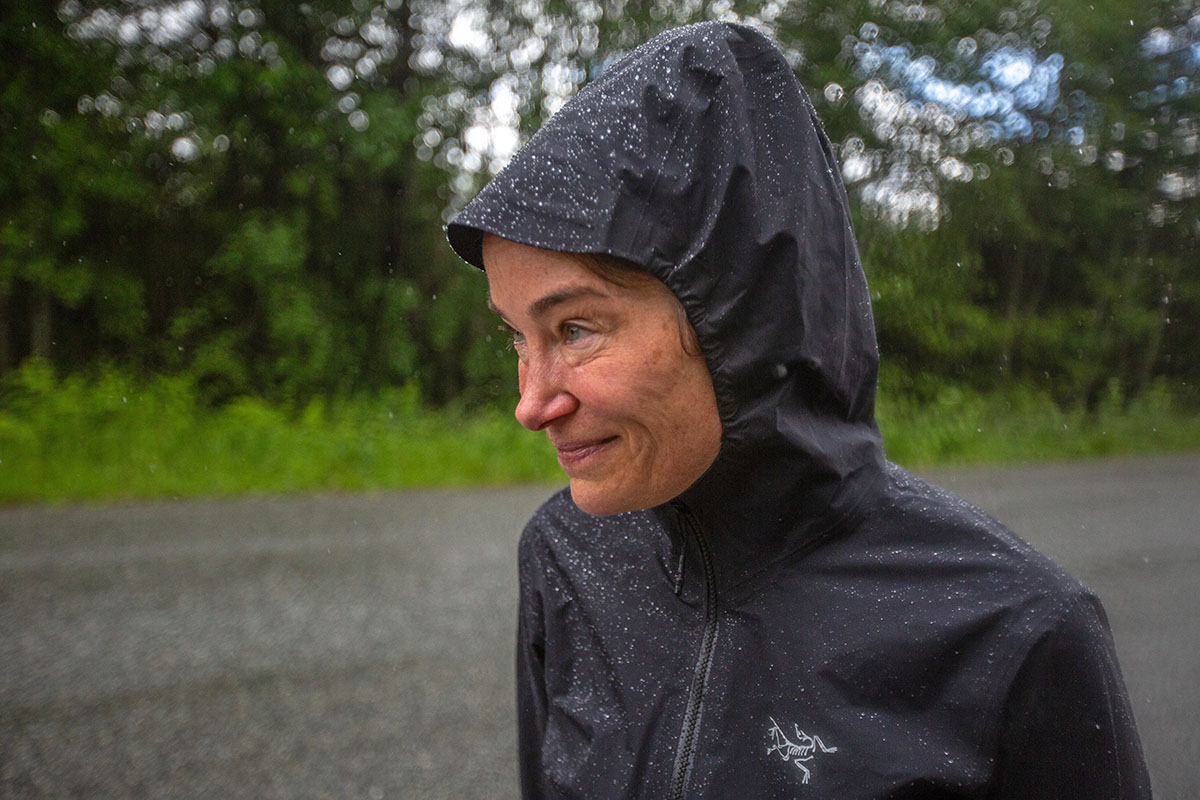
Breathability is paramount when working up a sweat, and the Norvan has done a great job keeping me comfortable on heart-pumping runs. To be sure, the Gore-Tex membrane means it doesn’t breathe as well as a non-waterproof softshell, but I’ve had no issues with overheating when exerting in cooler temperatures. It’s also worth noting that there are no vents or pit zips for dumping excess heat, which hasn’t been a dealbreaker for me but could pose issues for those who run particularly warm. And on the plus side, the soft C-Knit backer does a great job minimizing the sticky, clammy feel common among waterproof shells.
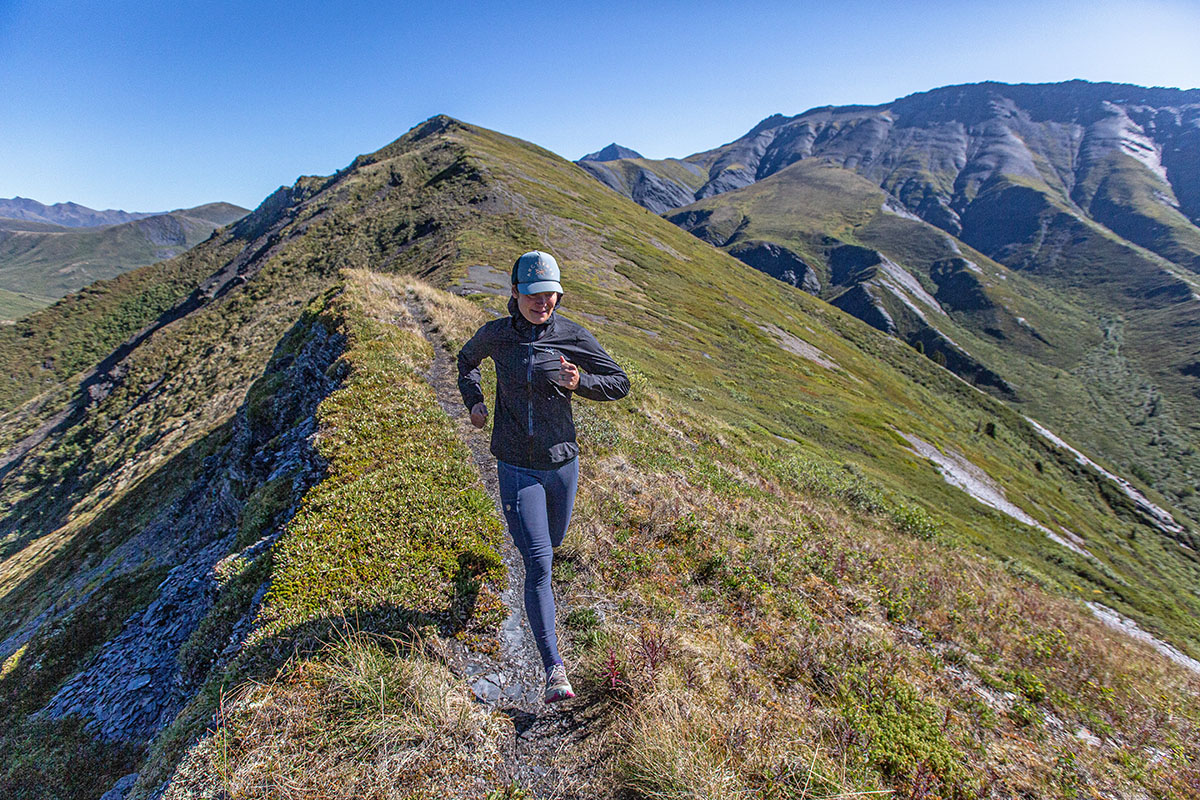
At a scant 5.7 ounces on my scale for my women’s size small (it’s listed at 6.7 oz.), the Norvan is handily one of the lightest waterproof shells on the market. For comparison, Patagonia’s similarly intentioned Storm Racer Jacket clocks in at a comparable 6.3 ounces, while Salomon’s Bonatti Waterproof is just 5.3 ounces. You can go even lighter with Rab’s Phantom Waterproof Pull-On (2.5 oz.), but that jacket uses a downgraded 2.5-layer waterproof membrane and features a partial-length main zipper. In the end, any piece this light will make some inherent compromises, but I feel the Norvan is competitively well rounded for a jacket that weighs as much as a few snacks.
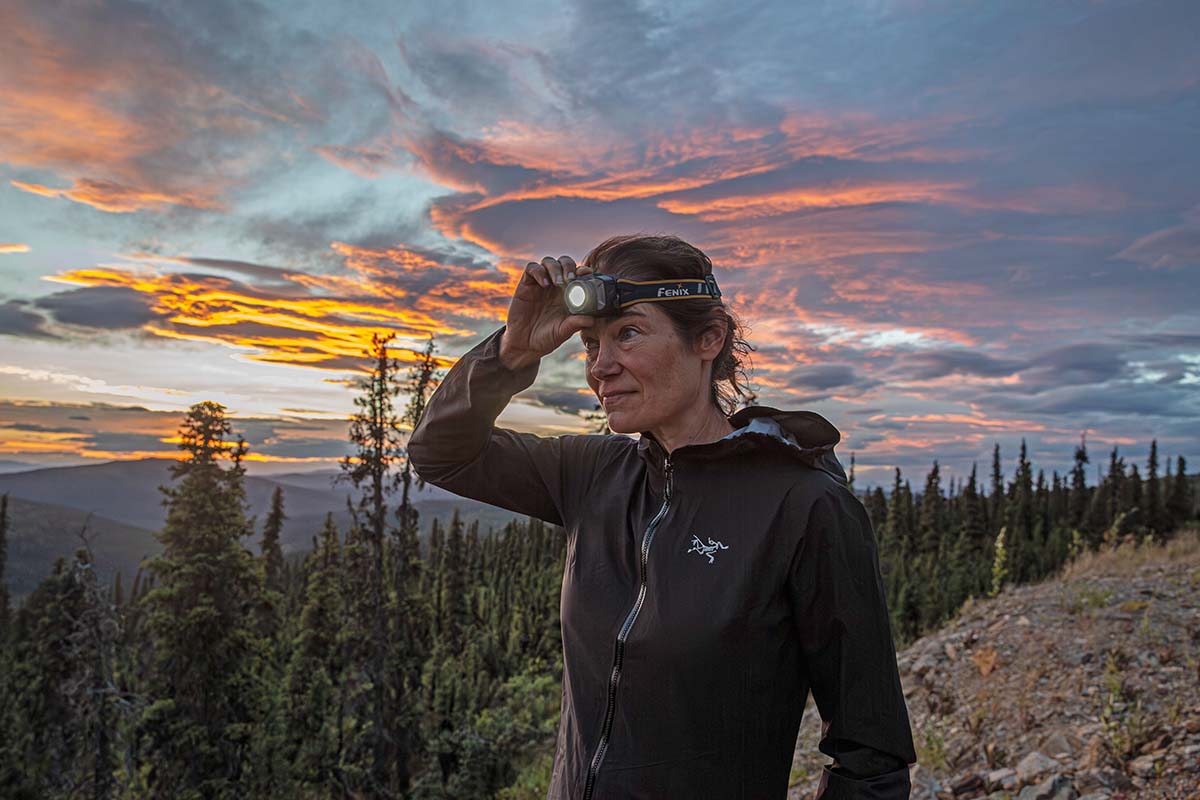
As expected, the Norvan Shell Jacket packs down impressively small for storage. There’s no stuff sack or dedicated stuff pocket, but it’s easy to pack into its hood and cinch tight via the single drawcord. When compressed, the package is about the size of an orange and fits inside my camping mug. Given the diminutive size, I have no hesitations about stuffing the jacket in my running vest or hydration pack as a “just-in-case” layer when the forecast is iffy or I’m anticipating a lot of time on exposed, windy ridgelines.
The Norvan Shell Jacket exceeded my expectations in comfort, too. As I touched on above, the C-Knit backer does a great job wicking moisture and feels soft and comfortable against bare skin. Mobility is also excellent thanks to the articulated patterning, and I’ve experienced zero restriction while running, reaching overhead, etc. All in all, it’s the kind of piece you can put on and forget about—and you can’t really ask much more of a rain jacket.
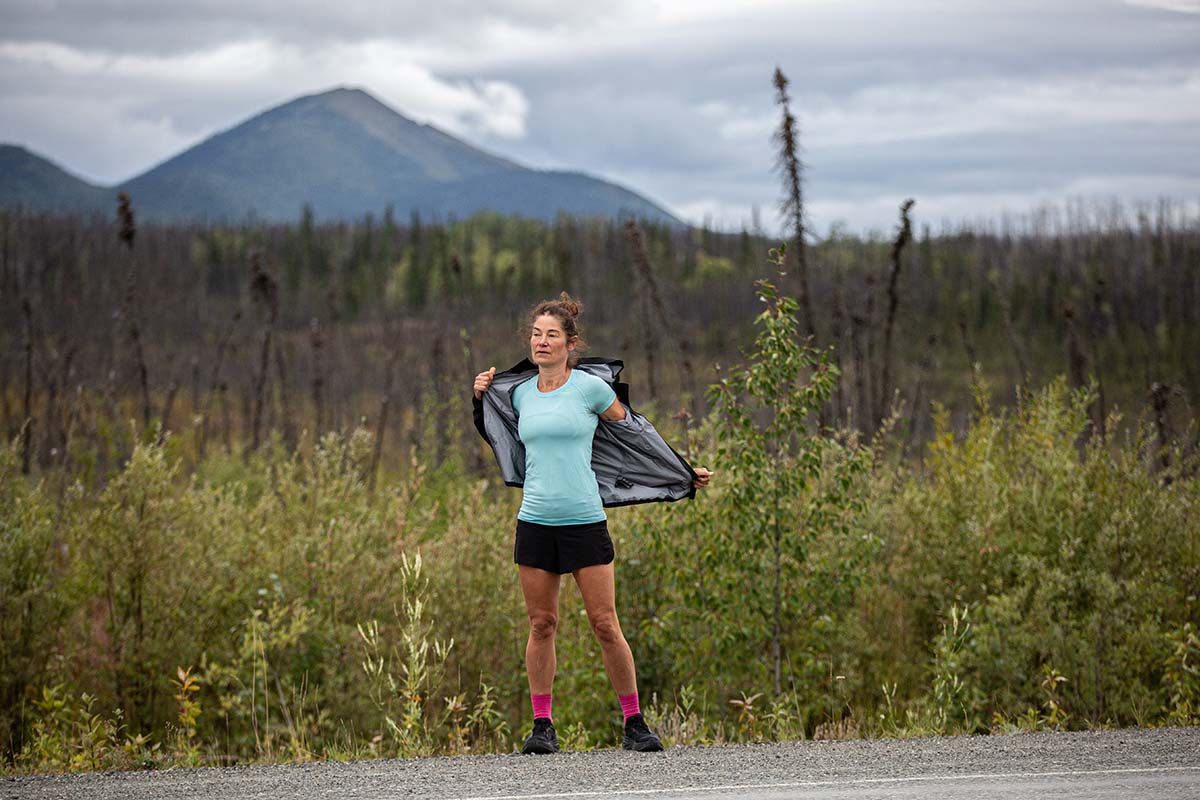
Arc’teryx is known for pumping out premium pieces, and the Norvan Shell Jacket is no exception. While undeniably thin at 13-denier (D), the shell fabric has held up flawlessly thus far despite considerable bushwhacking in the Yukon. What’s more, the shoulders show zero signs of wear despite frequently coming into contact with my running vest. And while delicate, all of the zippers and reflective details are intact with no issues to report. As always, it’s best to exercise caution around sharp equipment and pokey trail obstacles like branches, but the Norvan has exceeded my expectations thus far for such a light and minimalist piece.
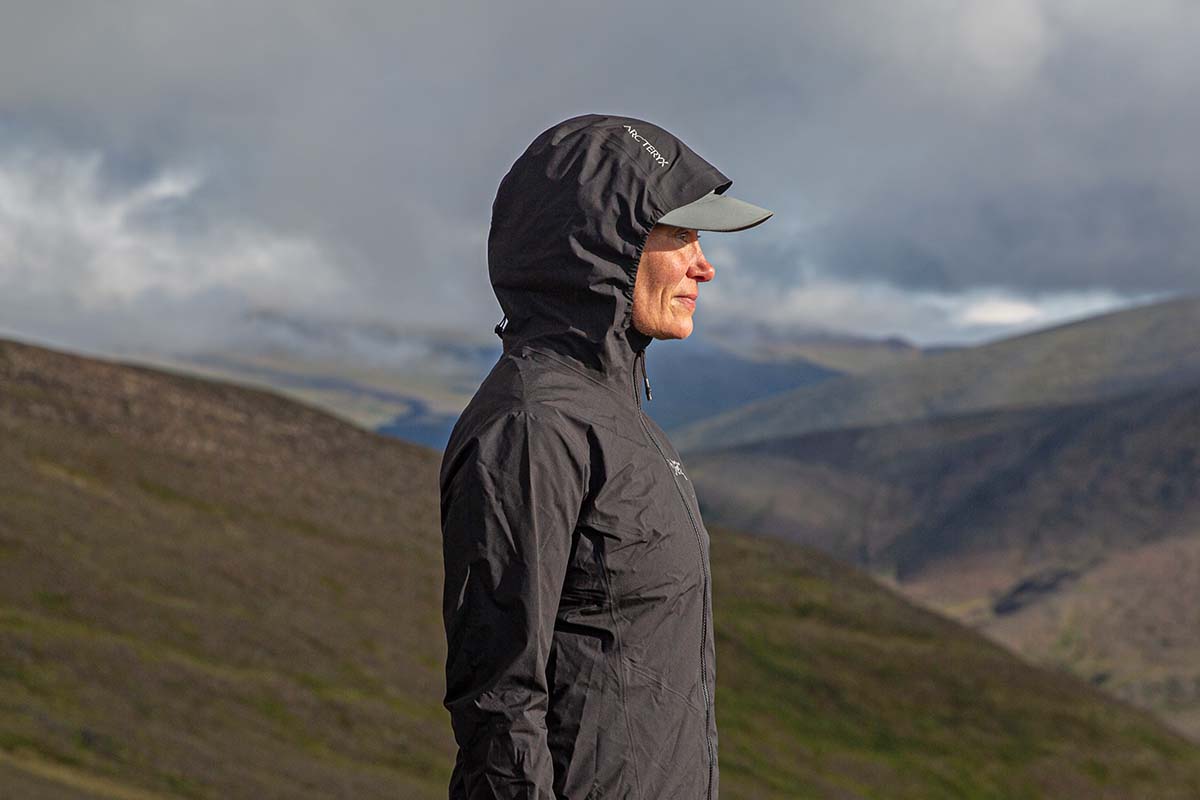
There are always trade-offs to keeping weight low, and one of the Norvan’s is its very limited feature set. Starting with the hood, the design is low-profile, features a laminated brim for deflecting moisture (although I often prefer the added coverage of a ball cap), and boasts a single toggle at the back for tweaking fit. For storage, you get a single internal pocket that can hold a key and credit card. I’m not one to store my phone in my jacket pocket while running due to potential bounce, but it’s worth noting that the Norvan’s interior pocket is too small to fit a smartphone. Rounding out the feature set, you get a Recco reflector embedded at the back of the hood, which will help rescuers pinpoint your location in the event of an emergency, along with reflective detailing to boost visibility in inclement weather. The latter are a nice touch, although they’re small enough that I wouldn’t trust them to alert drivers in truly challenging conditions.
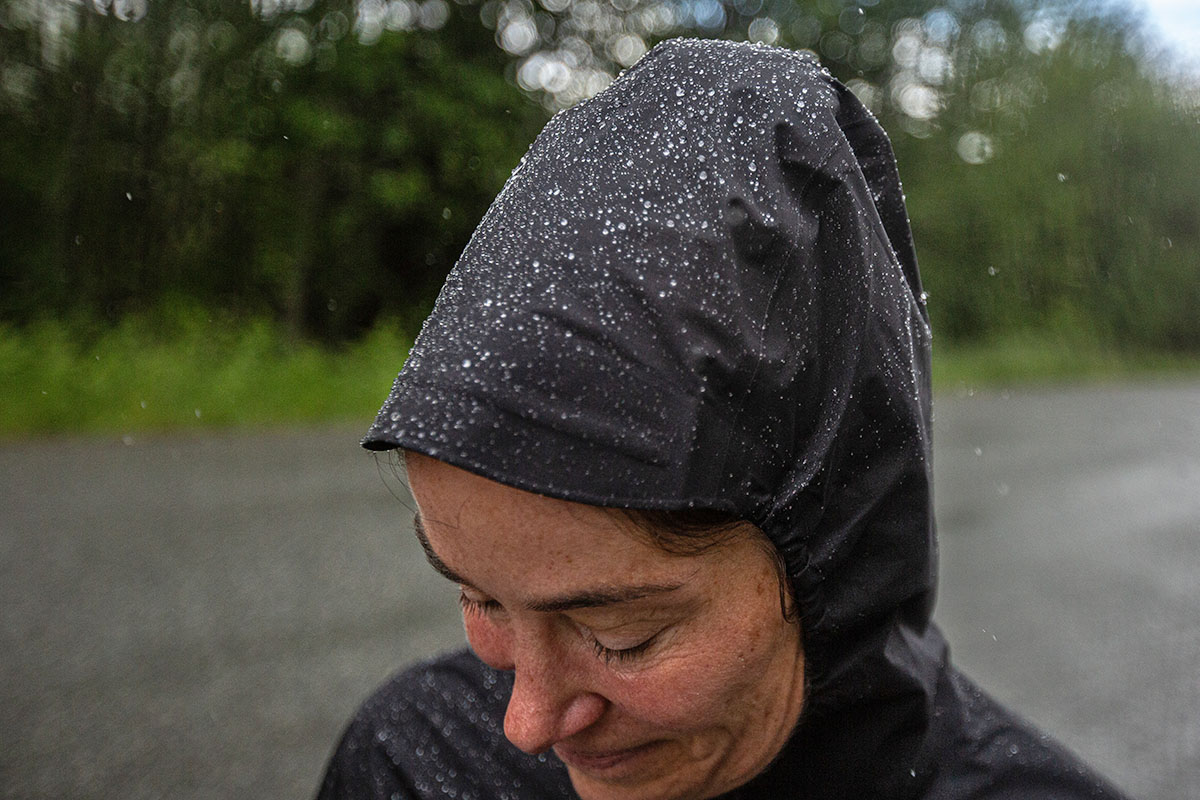
The Norvan Shell Jacket falls into Arc’teryx’s “fitted” category, which translates to minimal bulk and a very streamlined look and feel. In my usual women’s size small, I found that the shell fit perfectly for running, with no riding up or bunching with or without a pack. Additionally, the sleeves and hem are the perfect length for my 5’8” frame, and overall mobility is excellent thanks to the articulated patterning that minimizes tension in movement-dependent areas (e.g., under the arms). Taken together, the Norvan’s fit lines up very well with its intentions as a trail running-specific piece.
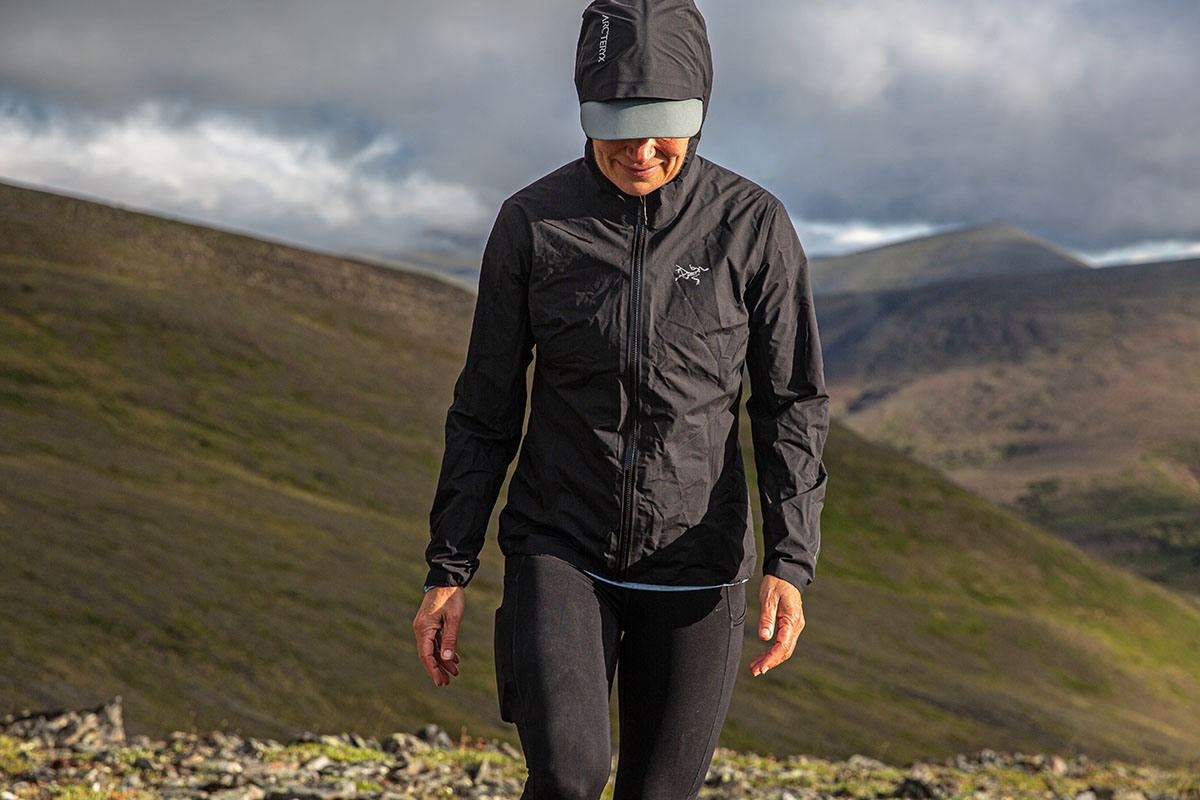
We appreciate when brands take steps to reduce their impact on the environment, and Arc’teryx employed a couple notable sustainability measures with the Norvan Shell Jacket. Specifically, the jacket uses bluesign-approved materials that have been deemed safe for workers, consumers, and the environment. It’s also Fair Trade Certified, which means Arc’teryx put extra money into production to ensure workers are compensated fairly. It’s worth noting that they’re aiming to have 80% of their products meet this standard by 2025, which is a commendable goal.
I tested the women’s Norvan Shell Jacket for this review, and it’s also sold in a men’s version for the same price. Comparing the two, the men’s Norvan Shell Jacket is sold in slightly different two-tone colorways but is otherwise largely identical to the women’s model—including the same listed weight. To complete your kit, Arc’teryx offers Norvan Shell pants for both men and women, which retail for $250 and feature the same 3-layer Gore-Tex protection. There are several other styles within the wider Norvan collection, from insulated jackets and vests to hats and trail running shoes, but only those with the “Shell” or “GTX” designation are fully waterproof.
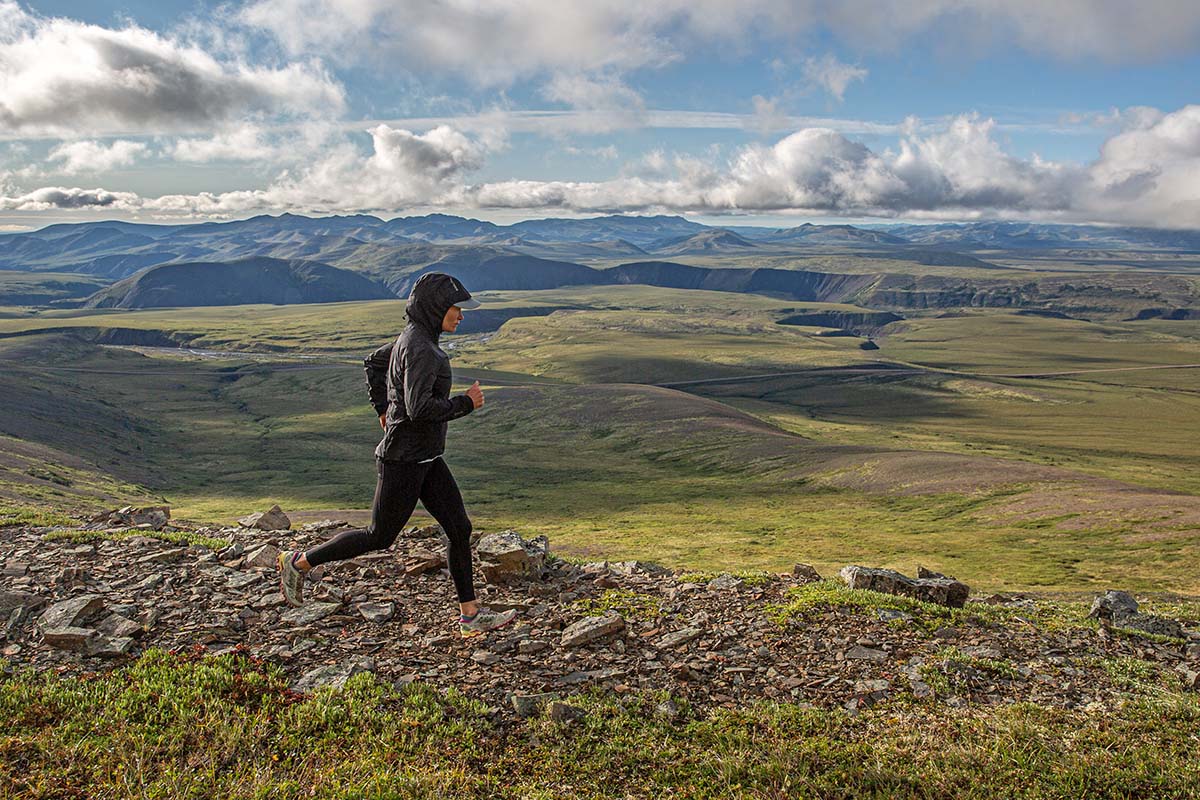
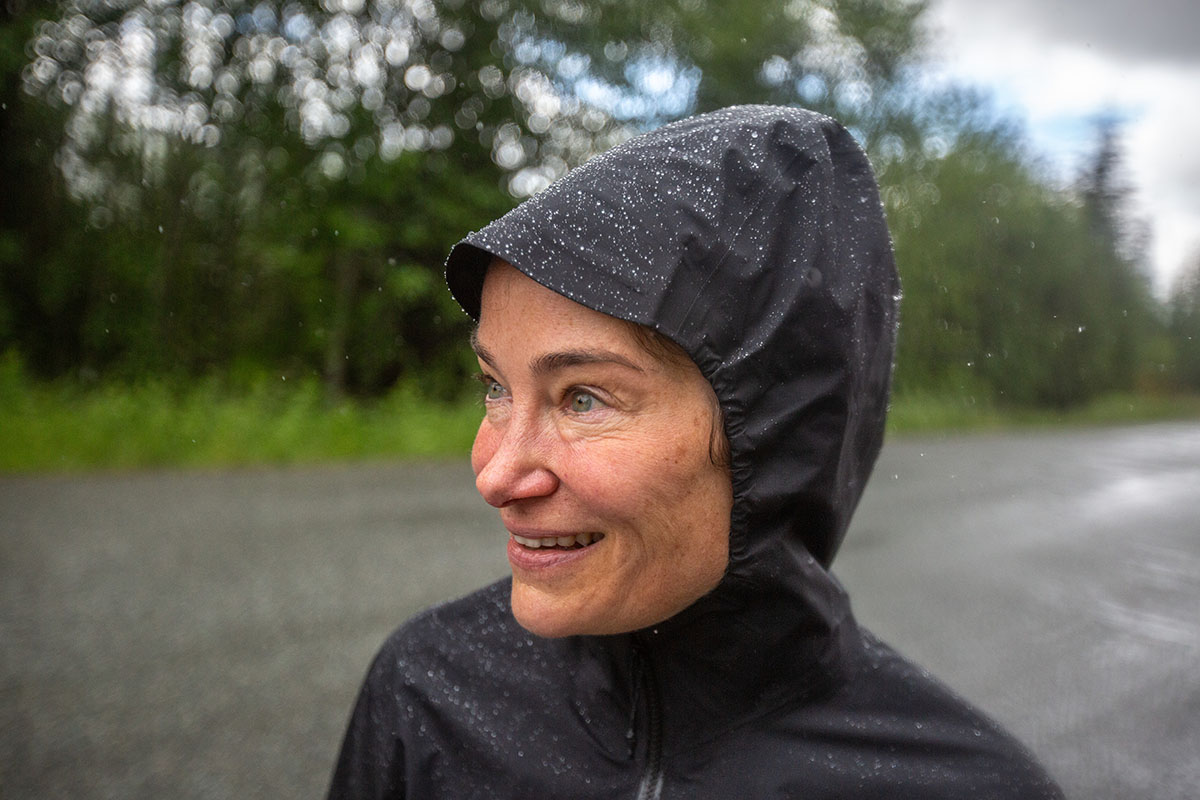
| Jacket | Price | Weight | Waterproofing | Denier | Pockets | Packable |
|---|---|---|---|---|---|---|
| Arc’teryx Norvan Shell Jacket | $400 | 6.7 oz. | 3L Gore-Tex | 13D | 1 | No |
| Patagonia Storm Racer Jacket | $299 | 6.3 oz. | 3L H2No | 20D | 1 | Yes |
| Rab Phantom Waterproof Pull-On | $215 | 2.5 oz. | 2.5L Pertex Shield | 7D | 0 | Yes |
| Salomon Bonatti Waterproof | $180 | 5.3 oz. | AdvancedSkin Dry | Unavailable | 2 | No |
| Black Diamond Alpine Start | $185 | 6.4 oz. | None (DWR finish) | Unavailable | 1 | Yes |
The Norvan Shell is a fairly specialized rain jacket that’s purpose-built for trail running, which means there’s not a ton of direct competition in the market. That said, Patagonia makes a very enticing alternative in their aptly named Storm Racer Jacket. For around $100 less than the Norvan, the Storm Racer is comparably light at 6.3 ounces, boasts a similar hood design with a single toggle for adjustment, and also features a 3-layer construction (in this case, Patagonia’s in-house H2No membrane) for trustworthy protection in inclement weather. You also get a single pocket for storage, although Patagonia opted to place it along the exterior rather than the interior (plus, it doubles as the jacket’s stuff sack). Finally, Patagonia managed to tack on a hem drawcord, which the Arc’teryx lacks. In the end, it’s hard to beat the proven performance of Gore-Tex waterproofing, but the Storm Racer wins out in every other metric, earning it our vote over the Norvan.
U.K.-based Rab is another technical mountain specialist, and their Phantom Waterproof Pull-On Jacket gives the Norvan a run for its money in a few areas. First is weight, with the Phantom checking in at a scant 2.5 ounces (2.6 oz. including the separate stuff sack for storage). Importantly, Rab managed to accomplish this while retaining a pretty solid feature set, including an adjustable hood, a water-resistant main zipper, and reflective branding to help with visibility. That said, the Phantom omits pockets, uses an even thinner 7D shell fabric, and features a downgraded 2.5-layer Pertex Shield build that’s less impervious than the Norvan’s 3-layer Gore-Tex construction. Some also won’t love the pullover style, which makes it harder to regulate temperature and swap between layers as conditions shift. It’s true that the Rab will save you a considerable $185, but the Norvan strikes us as the less compromised piece for committed runners.
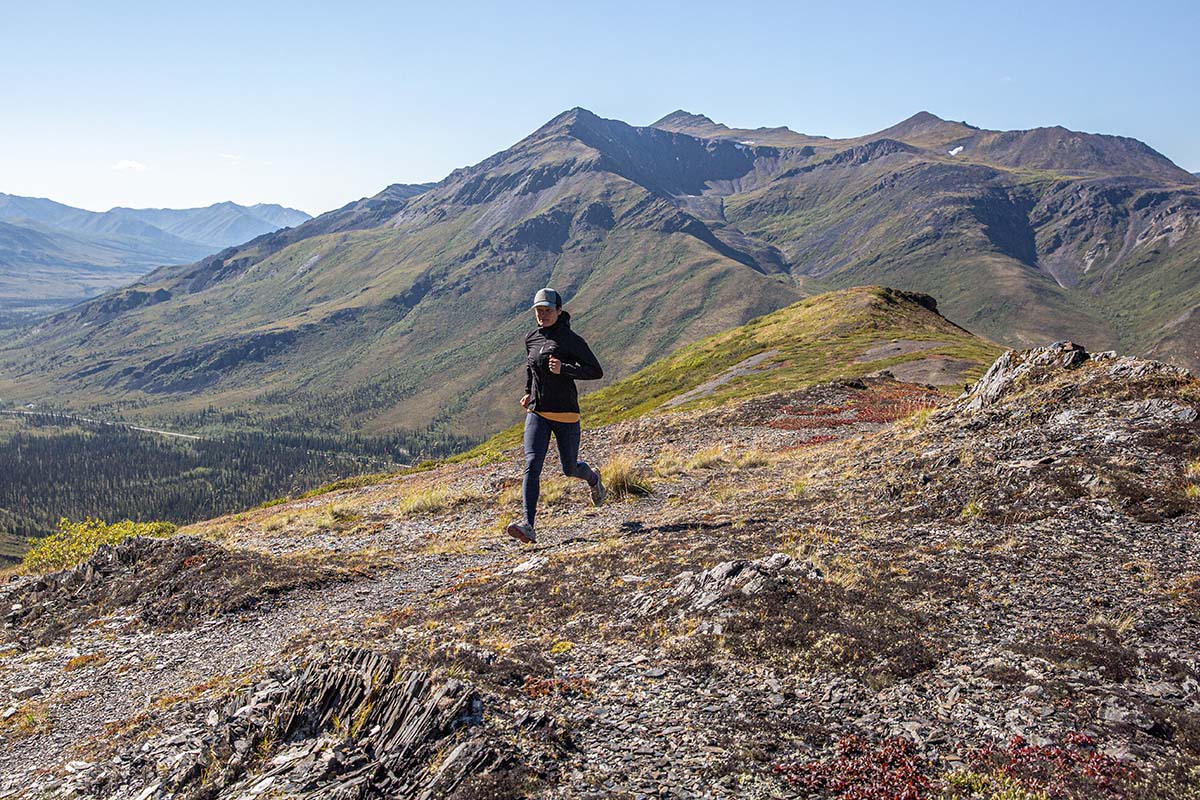
Next up is Salomon’s Bonatti Waterproof Jacket, which is even cheaper than the Patagonia and Rab alternatives at $180. It’s also the lightest of the bunch at 5.3 ounces without skimping on features. In fact, the Bonatti boasts two pockets compared to the Norvan’s one, tacks on a snap at the front for venting, and incorporates mechanical stretch for added mobility. The biggest differences come in the form of comfort and protection: The Norvan's Gore-Tex membrane is notably suppler than the Salomon’s construction, easier to trust in truly gnarly weather, and breathes better when you’re working up a sweat. Whether or not these advantages are worth the $220 price jump is up to you, but it’s hard to argue with Arc’teryx’s premium fit and finish.
Last but not least, those who run in mostly favorable weather may want to consider a non-waterproof design like Black Diamond’s Alpine Start Hoody. Toeing the line between a windbreaker and softshell jacket, the Alpine Start offers great range of motion, impressive breathability, and far better durability than the fragile-feeling Norvan. The BD also features a relatively roomy fit and helmet-compatible hood that are great for colder days in the mountains. And while no match for Gore-Tex, the shell’s robust nature, in addition to Schoeller’s Eco-Repel Bio DWR finish, means you get solid protection in wet weather. In fact, we’ve worn the Alpine Start in all-day drizzles and blowing snow and never once wished for more jacket. Given our experiences, we feel the BD is the far more versatile piece for most runners and a much better value at $185.
If you’re thinking about buying gear that we’ve reviewed on Switchback Travel, you can help support us in the process. Just click on any of the seller links above, and if you make a purchase, we receive a small percentage of the transaction. The cost of the product is the same to you but this helps us continue to test and write about outdoor gear. Thanks and we appreciate your support!
Depending on the seller, most products ship free in the United States on orders of $50 or more. International shipping availability and rates vary by seller. The pricing information on this page is updated hourly but we are not responsible for inaccuracies.